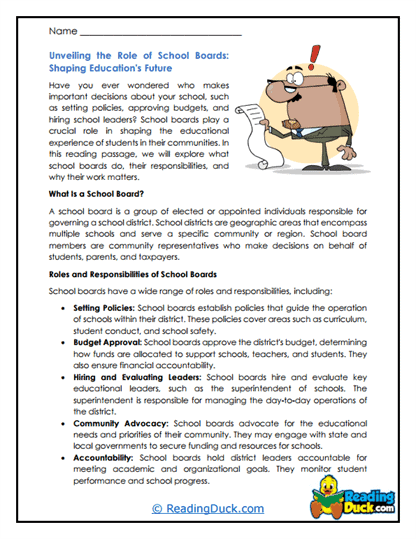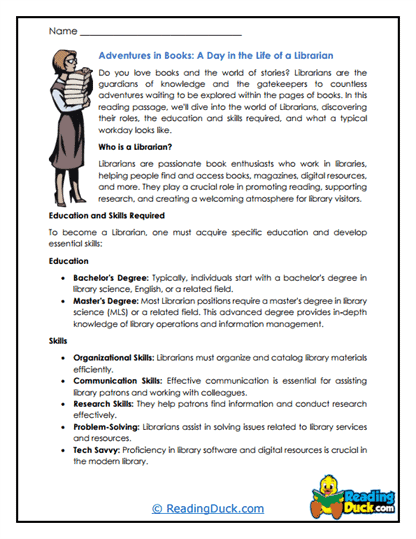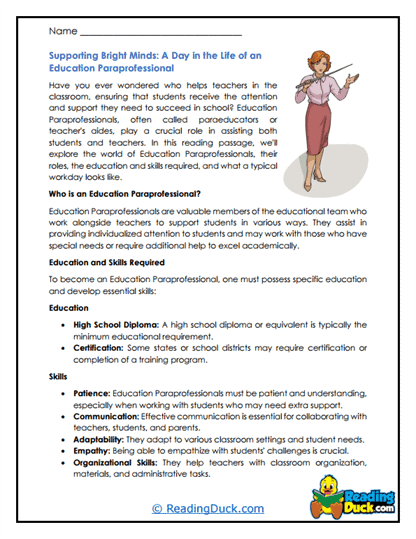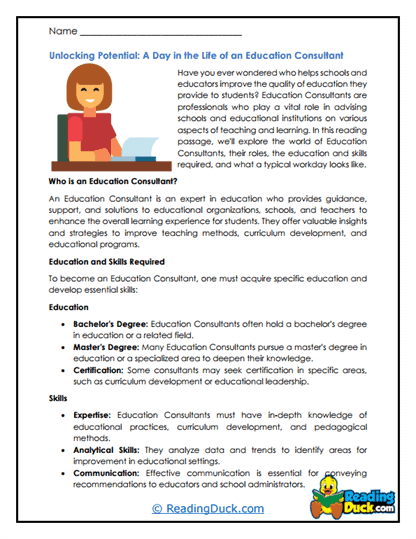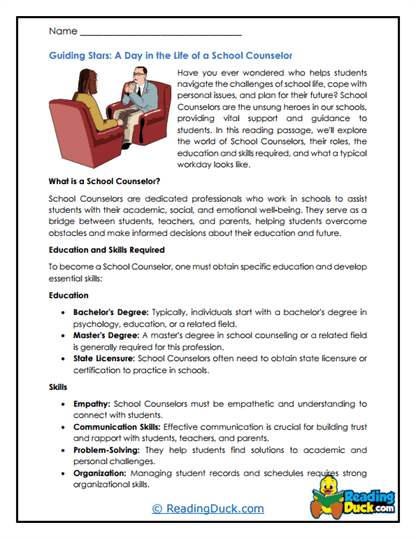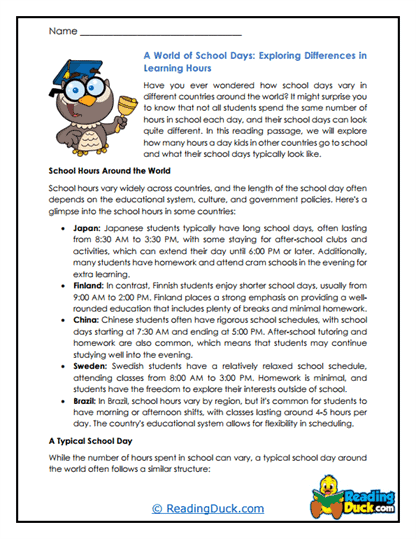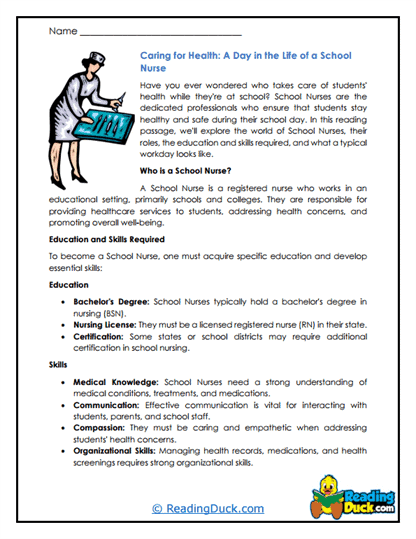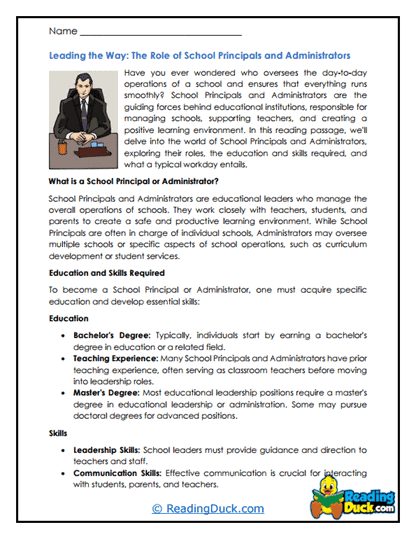Education Worksheets
About Our Education Worksheets
Our Education Worksheets offer students an insightful exploration into the world of education, diving deep into its philosophies, key figures, and the concept of education as both a profession and a cultural cornerstone. While these worksheets fall under the "Culture" category, they focus specifically on education itself rather than comparing educational practices across different cultures. The worksheets are designed to provide a comprehensive understanding of education's role in shaping society, as well as the evolution and impact of educational systems.
This topic contains several worksheet sets, each focusing on a specific aspect of education. Each worksheet set includes:
- Multiple Choice Questions: These questions assess students' comprehension of the reading passages, focusing on key details about educational theories, historical developments, and influential educators.
- Short Answer Questions: Students provide concise responses, summarizing important information, analyzing the significance of various educational practices, and reflecting on the role of education in personal and societal growth.
- Open-Ended Questions: These questions encourage students to think critically and express their personal interpretations, opinions, and preferences related to the topics they have read about, fostering a deeper connection to the material.
These worksheets help students demonstrate their understanding of educational concepts and history while engaging meaningfully with the subject. An answer key is provided for each question sheet, making it easy for teachers and parents to evaluate student progress. All worksheets are available as PDF files, which can be easily viewed electronically, downloaded, and printed.
The Pillar of Society: Understanding Education
Education is a fundamental pillar of society, playing a crucial role in shaping individuals and communities. It is not just about imparting knowledge but also about fostering critical thinking, encouraging curiosity, and preparing individuals for active participation in society. The study of education allows students to explore its evolution, understand the philosophies that have guided educational practices, and recognize the impact of key figures who have shaped modern education. By delving into these topics, students gain a comprehensive understanding of the multifaceted nature of education and its profound influence on human development.
When studying education, students encounter a variety of key concepts and areas of interest:
- Historical Development of Education: Education has a rich history that reflects the evolution of human societies. Students learn about the origins of formal education in ancient civilizations, such as the schooling systems of ancient Greece and Rome, the monastic schools of the Middle Ages, and the emergence of public education during the Enlightenment. They explore how educational practices have changed over time, influenced by cultural, political, and economic factors. This historical perspective helps students understand how education has evolved to meet the needs of different eras and how it continues to adapt to contemporary challenges.
- Philosophies of Education: Education is guided by various philosophical frameworks that shape teaching methods, curriculum design, and the goals of schooling. Students explore major educational philosophies, such as pragmatism, constructivism, and humanism, understanding how these theories influence the way educators approach teaching and learning. For example, they might study John Dewey's advocacy for experiential learning, Maria Montessori's child-centered approach, or Paulo Freire's emphasis on critical pedagogy. By examining these philosophies, students gain insight into the diverse ways education can be conceptualized and implemented.
- Key Figures in Education: The field of education has been shaped by the contributions of many influential educators and reformers who have challenged existing practices and introduced new ideas. Students learn about the lives and work of figures such as Socrates, whose method of questioning laid the foundation for critical thinking; Horace Mann, who championed public education in the United States; and Malala Yousafzai, who advocates for girls' education worldwide. By studying these key figures, students can see how individual visionaries have driven educational progress and inspired change.
- The Role of Education in Society: Education is not just an individual pursuit; it plays a critical role in shaping societies. Students examine how education contributes to social cohesion, economic development, and the promotion of democratic values. They explore the relationship between education and social mobility, understanding how access to education can empower individuals and reduce inequalities. Additionally, students consider the challenges facing education today, such as addressing the needs of diverse learners, integrating technology into the classroom, and ensuring that education is accessible to all.
- Education as a Profession: Teaching is a profession that requires a deep understanding of both content and pedagogy, as well as a commitment to fostering student growth. Students explore what it means to be an educator, from the preparation and training required to the day-to-day responsibilities of teaching. They learn about the different roles educators play, including classroom teaching, curriculum development, and educational leadership. This exploration of education as a profession helps students appreciate the dedication and skill required to be an effective teacher.
- Global Perspectives on Education: While the focus of these worksheets is not on comparing educational systems across cultures, students are encouraged to consider how education is approached in different parts of the world. They explore global initiatives aimed at improving access to education, such as UNESCO's efforts to promote literacy and the United Nations' Sustainable Development Goal of ensuring inclusive and equitable quality education for all. This global perspective helps students understand the universal importance of education and the ongoing efforts to address educational disparities.
Through these topics, students gain a well-rounded understanding of education as both a practice and a field of study. They learn to appreciate the complexities of educational systems and the ways in which education shapes individuals and societies.
Where To Use These Worksheets
Integrating education worksheets into a curriculum can enhance students' learning experience across various subjects and grade levels. Here are some practical ideas on how and where these worksheets can be used:
- History and Social Studies Classes: Use these worksheets to help students explore the historical development of education and its impact on society. Students can analyze how educational practices have evolved in response to social changes, political movements, and cultural shifts. For example, they might study the rise of public education during the Industrial Revolution or the role of education in promoting civil rights.
- Philosophy and Ethics Classes: Incorporate the worksheets into lessons on philosophy and ethics to explore the various educational philosophies that have influenced teaching and learning. Students can engage in discussions about the goals of education, the ethics of educational practices, and the role of educators in shaping moral and intellectual development.
- Literature and Language Arts Classes: Use the worksheets to examine how education is portrayed in literature and media. Students can analyze characters who are educators, students, or reformers, and explore the themes of learning, knowledge, and intellectual growth in literary works. This approach encourages students to think critically about the role of education in shaping individual identity and social values.
- Career and Technical Education (CTE): Integrate the worksheets into CTE programs focused on education, child development, or educational leadership. These materials can help students explore career paths in education, understand the skills required to be an effective educator, and plan their educational and professional goals. Practical exercises, such as creating lesson plans or designing educational programs, can enhance this learning experience.
- Civics and Government Classes: Include the worksheets in civics and government classes to explore the relationship between education and democracy. Students can study the role of education in promoting civic engagement, critical thinking, and informed citizenship. They might also explore the challenges of ensuring equal access to education and the role of government in supporting public education systems.
- Cultural Studies and Anthropology Classes: Use the worksheets in cultural studies or anthropology classes to explore the role of education in different societies. Students can research traditional educational practices, analyze the impact of colonialism on indigenous education, or study the role of education in cultural preservation and transmission.
- Interdisciplinary Projects: Encourage students to participate in interdisciplinary projects that combine education studies with other subjects, such as science, technology, or the arts. For example, students could design a science curriculum that integrates hands-on experiments, explore the use of technology in enhancing learning outcomes, or create an educational outreach program for a local community.
Skill Development Through Education Worksheets
Studying education through these worksheets can significantly enhance students' critical thinking, analytical, and communication skills. Education as a topic requires students to consider complex ideas, such as the purpose of schooling, the impact of educational practices, and the role of educators in society. By exploring these concepts, students develop a deeper understanding of how education shapes the world and their own lives.
In addition to academic benefits, studying education helps students build empathy, ethical awareness, and a sense of social responsibility. Understanding the importance of education fosters a commitment to lifelong learning and encourages students to think about how they can contribute to the improvement of educational systems and practices.
Overall, these education worksheets provide a comprehensive and engaging way for students to explore the world of education, gain a deeper understanding of its cultural significance, and develop skills that will serve them in their academic and personal lives.
